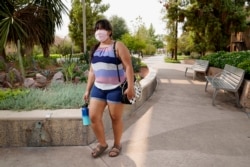The coronavirus health crisis has had an unexpected effect on an event that happens once every 10 years in the United States: the U.S. census.
For example, Betsy Landin was listed by her parents on the 2020 census as living at her family’s home in Phoenix, Arizona. But experts say she should have been counted in the city of Tempe where she goes to school.
“We really didn’t have any instruction or guidance at school about how to fill out the census,” Landin said.
The same thing happened to Betzabel Ayala. She was counted in Phoenix because she was living at home after the coronavirus shutdown of colleges around the country.
Where to count students for census
The question of where to count off-campus college students in any census can be difficult. Parents often think their college-age children should be counted with them.
Hundreds of thousands of U.S. college students are being counted for the 2020 census at their parents’ homes or other places. These students normally live in non-university housing and are supposed to be counted where they go to school.
Ames, Iowa is home to Iowa State University. The city has a population of 67,000 people. Officials are worried that if the 2020 census misses the more than 15,000 students who live off-campus, it could put the city’s population count below 50,000.
Undercounting
Some people say the coming undercount could harm college towns across the country. In some places with major universities, students make up as much as three-fourths of the population.
Most people received information from the 2020 census in March. That is also when restrictions in much of the U.S. went into effect to stop the spread of the coronavirus. Many schools switched to online classes, causing many students to leave. The Census Bureau says college students should be counted where they would have been on April 1 if not for the health crisis.
The Census Bureau sought the help of college administrators in getting lists of students who do not live on campus or have left town. But many universities did not want to take part because of privacy concerns. In addition, off-campus students at many schools are not required to provide information about where they live.
A lot of what is provided by the schools is also missing important information, such as birthdates. That is from a report last month by the office inspecting the U.S. Census Bureau.
The undercount problem, however, involves only students living off campus in non-university housing. The Census Bureau uses records supplied by colleges to count students living in dormitories or university apartments.
But, off-campus students make up about 4 million of the 19 million college students in the U.S. That number comes from Dudley Poston, a demographer at Texas A&M University.
State College, Pennsylvania is home to Penn State University. Twenty-five percent of students living in one neighborhood there answered the 2020 census either online, by mail or by phone. Douglas Shontz, a city spokesman, said the current percentage is much lower than the 60 percent who answered the 2010 census.
With less than a month left until the census ends, the city has placed signs all over downtown State College. The city also spent $5,000 mailing out postcard reminders about the census to students who returned for the fall semester to off-campus apartments or fraternity and sorority houses.
“We are kind of begging at this point for students to do the right thing,” Shontz said.
Steve Patterson is the mayor of Athens, Ohio. He said if Ohio University’s graduating class of 3,500 students was not counted last spring, the city could lose $49 million in federal funding over 10 years.
Across the country, students’ answers to census questionnaires will affect how $1.5 trillion in federal money is spent and how many congressional seats each state gets.
I’m Mario Ritter, Jr.
Mike Schneider and Anita Snow reported this story for the AP. Mario Ritter Jr. adapted it for VOA Learning English. Hai Do was the editor.
________________________________________________________________
Words in This Story
campus – n. the grounds and buildings of a university or college
dormitory –n. a building on a school campus where students can live
demographer –n. a person who studies changes in population in human populations
questionnaire –n. a document that asks people to provide answers to questions that are used to collect facts and opinions
fraternity –n. an organization of male students on a U.S. college campus
sorority –n. an organization of female students on a U.S. college campus
We want to hear from you. Write to us in the Comments section, and visit our Facebook page.






